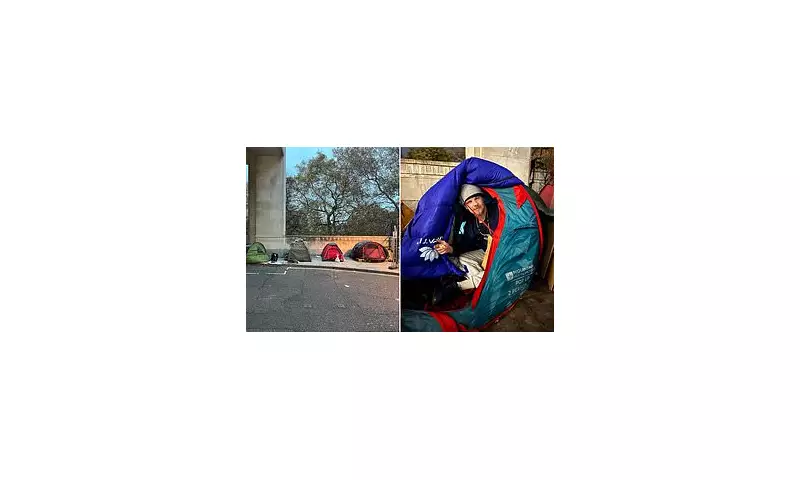
Behind the glittering façade of London's West End theatres and the luxurious Savoy Hotel, a hidden tent village provides shelter for approximately 30 homeless individuals, creating a stark contrast with one of the capital's most affluent districts.
The Hidden Community on The Strand
Nestled in the shadow of the Grade II-listed Adelphi Building, which houses prestigious publications including Vogue and GQ, approximately 20 tents form a makeshift community along The Strand. Many have been strategically positioned beneath a neo-classical archway, offering minimal protection from the elements.
The encampment hosts a diverse population including migrants from Romania, Uganda, and Germany, alongside British citizens from Scotland, northern England and London itself. Residents maintain their temporary homes with bicycles and donated food bags visible outside tents, with local office workers reportedly generous in their contributions.
Personal Stories from the Encampment
Tracy Wood, 42, a former graphic designer originally from Middlesbrough, has called this stretch of pavement home for six years. "Obviously it's not ideal, but it could always be worse," she told the Daily Mail. Having moved to London at 22 to design birthday and greeting cards, Wood lost her job approximately six years ago and found herself unable to pay rent.
"I've got good people around me, and there's good organisations out there that are doing the best they can do to help the homeless," she explained. "There's a fair amount of support here - that's why I've stayed here."
James Williams, 37, a British father of three from Tower Hamlets, has been homeless for eight or nine years but moved to this location two months ago seeking greater community support. "You get a lot of support here from people here, it's unreal," he said, while expressing concerns about his health conditions including Crohn's disease and having only one eye.
Williams voiced frustration about perceived inequalities in support systems: "To be honest with you, if I was a foreigner and I come over in a boat, I'd get a Ferrari and a mansion. But because I'm an Englishman and I was born in this country, nobody wants to help."
Winter's Brutal Reality and Systemic Challenges
Eric Mutebi, 46, who came to the UK from Uganda as a child and previously worked in removals, has lived at the site since 2022 after losing his job due to illness. He described the encampment as "the safest place you can be while living on the streets" but painted a harrowing picture of winter conditions.
"It gets down to minus six degrees and it's actually colder inside the tents than outside," Mutebi revealed. "You get people actually lying in the street blanketed up, trying to stay warm. So now, it's getting cold and most of are getting sick every night - all you're hearing is coughing, coughing, coughing, coughing."
Mutebi echoed concerns about prioritisation, noting: "You will find that people who just came to this country, such as migrants, they are prioritised and given more help with accommodation. Essentially the people who have just landed get priority over those of us who have literally been out here for years."
The local authority, in partnership with a homeless charity, will next month offer residents two weeks in accommodation to help them survive the coldest period.
Broader London Context and Official Responses
This encampment emerges alongside similar situations across central London, including a "shanty town" of tents on Tottenham Court Road and another group facing removal from Park Lane after Transport for London obtained a possession order.
A spokesperson for the Mayor of London stated: "The Mayor has made clear that no one should have to sleep rough on our streets. Under his leadership, more than 18,000 people have been helped off the streets." They highlighted a £10 million investment toward the goal of ending rough sleeping by 2030.
Westminster City Council, which contends with the highest rough sleeping numbers in the country, confirmed they are "in the process of gaining the necessary court order to clear the encampment at Adelphi Terrace, which is not a safe place to live and is disruptive to local people."
Despite the planned clearance, the council emphasised their teams work seven days a week to offer support with housing, addiction, and mental health problems to help people move away from homelessness permanently.






